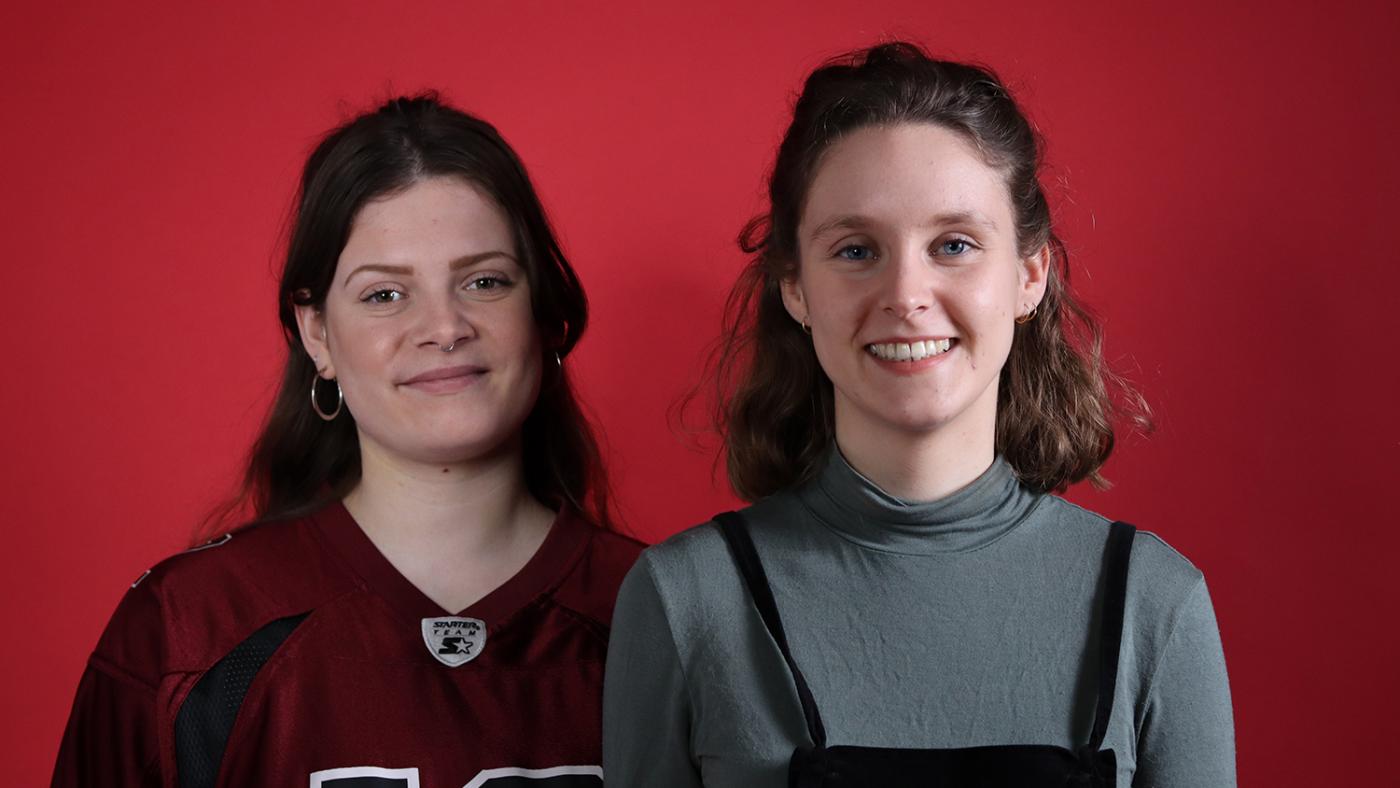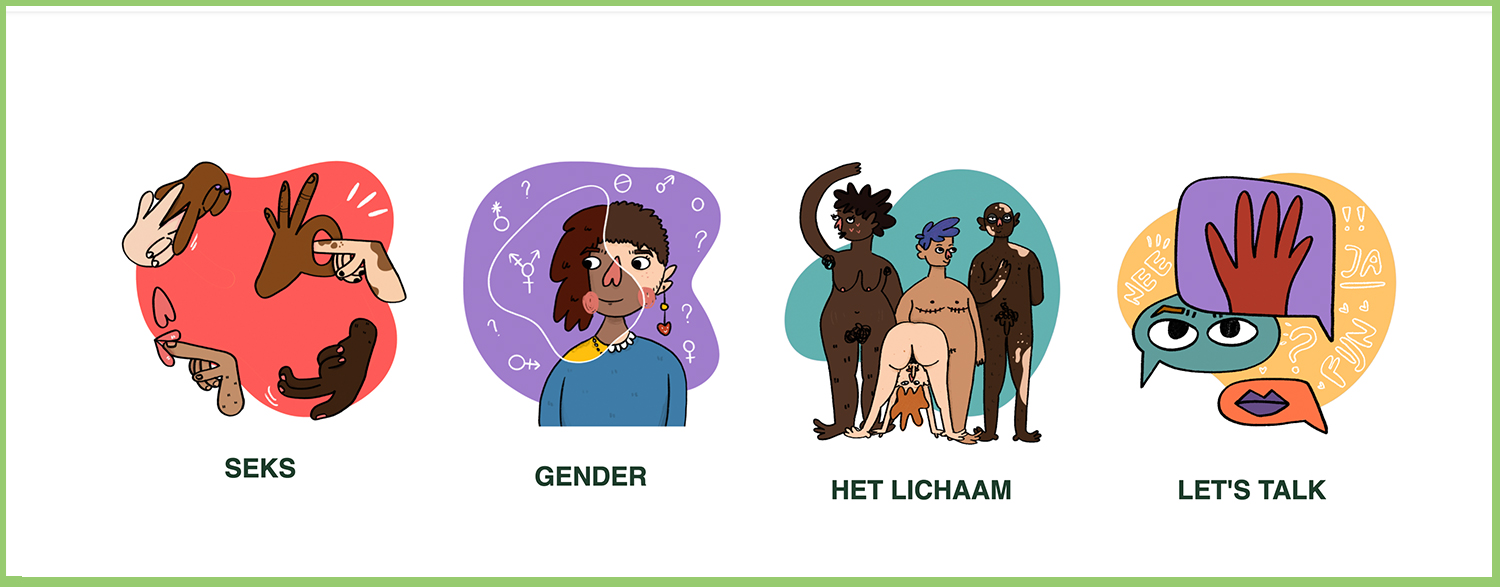Anthropology students make sex education more fun and inclusive

The first week after the launch of the website, which is only available in Dutch, was hectic for the two students, as FckYeah caused quite a stir. Now, two weeks later, things have calmed down a little but for Amber (24) and Nikita (22). The next challenge is to keep running the website alongside their studies and daily activities. “But where there’s a will, there’s a way”, says Nikita. After all, they both agree this is only the beginning.
Are you the Maeve and Otis of Utrecht University?
Amber: “Haha, no, we’re not. Though, at the start, most people we spoke with were fellow UU students, so perhaps there’s some truth to that. The funny thing is that when the Netflix series Sex Education premiered, we were already thinking about making a website. So, the series didn’t influence our decision, but it may have become a source of inspiration, I will give you that."
You were unsatisfied with the sex education you had received. What was the matter with it?
Amber: “Sex ed at secondary school in the Netherlands is rather one-sided. They emphasise standard subjects, such as penetration, pregnancy, and STDs. When you see all those STD images, it makes you think twice about having sex. I thought ‘what is this? Did I miss anything? How fun can this be?’ Only when we got to talking with our friends at he university did we find out that there was so much more to sex than that. That's when it got fun. So, we want more people to have that positive experience – we figured things needed to change.”
Nikita: “What stood out to me was the fact that sex education in the Netherlands is mainly about heterosexual sex, and not really about pleasure. We wanted to give pleasure the attention it deserves. How can you find pleasure in sex, and what other forms of sex are there?”
Does it shock you that sex education is still so limited nowadays?
Nikita: “It's still a complicated thing. The sex ed we get is what results from the interaction between governmental policy, the curriculum chosen by the schools, and the information parents would like their children to get. This tug of war only complicates the situation, as it invariably results in classes that give an incomplete picture. FckYeah.nl doesn’t have to inform parents or take the wishes of a school’s director into account. We are free to say 'this is lacking, this needs to added'. Young people can go to our site, independent from those other parties, and choose for themselves what they want to learn more about.”
What about parents, then? Do they play any role?
Amber: “Sex ed is a subject that arouses emotions. Some parents know how to deal with this subject and talk to their kids regularly about periods, falling in love, or sex. Other parents would rather not do that. Not to mention there are, of course, younf people who do not feel comfortable talking to their parents about this kind of subject. But considering the sex education our generation got was mediocre, you can imagine how little people from older generations learned about this subject at home."
Were you curious yourselves about some of the subjects addressed on the website?
Amber: “It's not that we wanted to talk about any particular subject, as our own sex life is not the reason for creating the site. Sex ed just needs to be more positive and more inclusive. There’s a lot of information in Dutch out there, but it’s all spread out. Like the television programs Spuiten en Slikken (Squirt and Swallow, Ed.) and Emma’s Peepshow, which cover a particular aspect of sex: sexual acts. Other channels discuss only the technical side of the story. The website Sense, which talks about sex, love and relationships, has gotten a recent makeover. But, up until a short while ago, it was not a fun page to visit.”
Nikita: “With the help of illustrations, social media posts and personal interviews, we try to make things more fun and accessible. We are really inspired by the show De Sekszusjes (The Sex Sisters, Ed.).They talk about sex-related subjects in a really personal, vulnerable and funny way. The difference is that FckYeah is broader and features the experiences of a lot more people. In the end, the most important thing is to provide sex education in different formats, so that everyone can find something that speaks to them."

A website for young people over the age of twelve about sexuality, gender and bodies. That can be quite hard to do. Does that age limit influence your way of doing things?
Amber: “Yes, we do differentiate clearly between interviews about personal experiences and information coming from experts. The website has been designed in such a way that not all information is visible directly. Some things you need to look for. We did that on purpose, to prevent confronting a visitor with something they are not prepared to see. So far, it's been working well.”
Is it hard to get young people to talk about their experiences?
Amber: “It’s actually not that hard, though women approach us more often. Especially in the beginning, before the website was launched, most people who came to us were women and members of the LGBTIQ+ community, which is evidenced by the subjects that were raised: they were mostly related to pleasure and non-heterosexual sex. We really had to work hard to reach other people. Finding and talking to heterosexual men is a challenge, but we managed to do it. More and more heterosexual men have been coming to our website, which is great. We're going to publish two interviews with heterosexual men next month.”
Why do you think that is?
Amber: “Sex education and many of the things you see in the media is really heteronormative (setting heterosexuality as the norm, Ed.) and focused on male pleasure. People who do not fit that mold are more inclined to reflect on what form of sexuality fits them, and seek it. For heterosexual men, that seems to be less of a need.”
Nikita: “But for heterosexual cisgender men (a cisgender or cissexual person is the one whose gender identity is the same as their sex assigned at birth, Ed.), there is a lot of work to do. For instance, although many people have their first encounter with sex through porn, porn isn't always the best reference. The website, therefore, is about a lot more than sex. We also talk about what it’s like to get pubes, or when your voice breaks. Those are interesting subjects for young men.”
What are the most popular topics on the website so far?
Amber: “One of our hot topics at the moment is ‘consent’, which means obtaining the other person's permission. What is consent, how do you handle it, and when do you ask for it? We have received so many questions about consent that we had to say: 'OK, enough about consent for now.' But that does illustrate the importance of the subject. Apart from that, when the country was on lockdown, people seemed to be more interested in reading about sexting, perhaps because it was hard to see others in person. I would also like to add that many university students are not really abiding by the Covid rules when it comes to dating. We haven’t been asked many questions about that.”
What is the most amazing thing that came from this project?
Nikita: “For me personally, it was the diversity in personal experiences. The interviews really paint a nice picture of how diverse things are, which is really great. Oh, and pronouns. Should you, upon meeting someone new, ask what their preferred pronouns are? That’s a subject I’ve started thinking about now, thanks to the website.”
Amber: “I agree with that. I think I’ve learned the most from the personal stories. As humans, we tend to centralise our own experiences. By listening to the experiences of others, we can learn about what is normal for other people, and how things come across to others. I haven't started looking at my own sex life differently, because many of the topics addressed by our site are not about sex. They also don’t always pertain to me, but to my environment and how I deal with other people.”
So you consider yourselves experts now?
Amber: “Haha – well, no.”
Nikita: “Expert is too big a word. I'm continuously learning new things, like when someone talks about an STD I’ve never heard of, or when we get emails about a particular subject. That's actually pretty fun: clarifying things. That's exactly what we want our website to do: talk to each other, discover things and learn from them.”